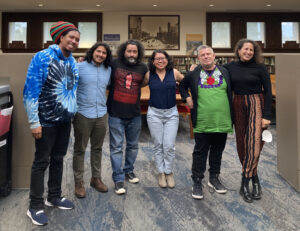Historical narratives in and of Washington, DC have long been rooted in the life stories and histories of propertied White men. This is the heritage that has been passed down through generations, particularly in formal “memory-keeping spaces,” like museums and archives. The DC History Center is no different, and the same can be said for many other historical institutions in the District. As a public historian, my work over the past year has been focused on expanding the perspectives and stories that we use to craft the historical narratives of DC.
After summer 2020, when the nation went through a period of self-reflection on race, it became apparent that today’s public is hungry for a more complete history of our city and the nation it represents. During this time, the DC History Center also began to look at itself and grapple with the legacy of racially discriminatory practices, and how—either intentional or not—those harms today affect their ability to tell the history of Washington’s diverse communities. In the midst of this internal evaluation, I was connected to the DC History Center by my mentor, DC historian Dr. Amanda Huron. Together with deputy director Anne McDonough, we designed a project that would take stock of how the city’s formal memory-keeping spaces have been capturing and retelling the history of Washington’s Latino/a/x communities. The final product from this first phase was the Researching Latino/a/x DC online resource.
We had several takeaways from this initial effort. Notably, we found that most of DC’s Latino/a/x histories can be found in what we have dubbed “living room collections,” or the intimate materials that individuals collect of their lives, families, and community histories in boxes, photo albums, and oral histories, among other material forms. Such community-based archives hold rich histories of DC’s Latino/a/x/ communities, and bringing them into formal historical repositories is a necessary step toward ensuring that those perspectives are included in the city’s collective narratives. Recognizing this, we asked ourselves: How do we include these living room collections in museums and archives in a way that is not extractive, reductive, and in which we are empowering communities themselves to construct their own historical narratives? It is my fervent belief that the absence of these stories from historical archives represents a loss for Washington’s entire population. These archival silences rob all Washingtonians of the lessons learned and tools for living contained within Latinx experiences of the District.
“The invisibility of DC’s Latino/a/x histories creates a feedback loop of alienation, whereby Latino/a/x individuals and communities distrust and avoid engagement with the established memory-keeping institutions that do not visibly value their histories. Without having access to Latino/a/x histories, institutions fail to incorporate such individual and community histories into their long-term plans.” –Excerpt from “Observations and Recommendations for Addressing Archival Silences at the DC History Center”
Informed by mistakes of the past, and in an effort to disrupt the ways in which underrepresented communities’ histories and cultures have been extracted by predominantly White institutions, the DC History Center established its Latino/a/x Outreach Working Group. As the inaugural Latino/a/x Community Outreach Fellow, it has been my pleasure to coordinate this working group over the past seven months as we work to develop a plan to address Latino/a/x archival silences. The Latino/a/x Outreach Working Group is composed of community members, scholars, artists, and educators who represent a myriad of DC’s Latino/a/x communities.
The working group was initially formed with a goal of putting together a public program that would highlight the DC’s Latino/a/x histories. While a modest goal, the DC History Center wanted to be mindful not to ask too much of individuals who are already active in their communities. But on our road to designing this program, it was clear that a single program would not be enough. The members of the Latino/a/x Outreach Working Group wanted to take on more. Together, the members and I drafted a list of observations and recommendations that the DC History Center could employ in their efforts to build community trust—a necessary first step toward any practical efforts in addressing archival silences of underrepresented communities. In May, we presented our draft, and the DC History Center staff in turn shared their new strategic plan. In June, we brought the plan and our draft back to our various communities, and in July we presented the final white paper, “Observations and Recommendations for Addressing Archival Silences at the DC History Center.”
Our biggest takeaway from these observations and recommendations is that community trust—true reciprocity—will require a consistent stream of interactions with the DC History Center in which Latino/a/x communities feel centered and valued by the DC History Center.
The first step towards this goal is to expand the presence of the Latino/a/x Outreach Working Group as a formal feedback loop within the DC History Center’s organizational structure. As such, in October 2022 a 10-member Latino/a/x Outreach Advisory Group will convene to continue to inform the DC History Center’s institutional plans towards addressing archival silences. If you would like to become involved in this advisory group, please contact programs@dchistory.org.

Convened by the DC History Center and led by Latinx Outreach Fellow Mariana C. Barros-Titus, the 2021-2022 Latino/a/x Outreach Working Group membership comprises José A. Centeno-Meléndez, José Gutiérrez, Rosalyn Lake, Kristy Li Puma, Sami Miranda, and Manuel Mendez. The group brings their extensive knowledge of the local Latino/a/x community as well as their professional expertise as historians, artists, researchers, teachers, and activists.